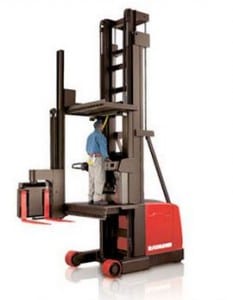Tomorrow is National Forklift Safety Day, which provides a great opportunity to educate our customers on best forklift  practices. Held each year during June’s National Safety Month and sponsored by the Industrial Truck Association, National Forklift Safety Day serves to highlight the correct and careful use of forklifts, and the importance of operator training. No one wants their employees to get hurt on the job, but these days, it is even more important than ever for many reasons.
practices. Held each year during June’s National Safety Month and sponsored by the Industrial Truck Association, National Forklift Safety Day serves to highlight the correct and careful use of forklifts, and the importance of operator training. No one wants their employees to get hurt on the job, but these days, it is even more important than ever for many reasons.
Proper training of forklift operators is a critical element to effective forklift safety. Approximately 42% of forklift fatalities result from the operator being crushed by a tipping vehicle. According to Section 5(a)(1) of the OSHA Act, the General Duty Clause: Operators of powered industrial trucks are obligated to use a restraint or seat belt. By complying, many unnecessary injuries could be avoided.
Aside from the top priority of keep your operators safe, you also have an obligation to keep costs low. By instilling smart safety practices, you could avoid hefty fines. OSHA fines can cost a company up to $7,000 for “minor” infractions, and up to $70,000 for repeat offenders.
On top of our obligation to help our people be safe, injured employees become costly in many other real ways. Workers compensation costs have risen sharply over the years. These injuries also drive up the Experience Modification Rates (EMR) rates which affect several things.
• High EMR numbers drive up insurance rates.
• If EMR costs are not fully absorbed by the company, they are passed to the employees.
• In order to retain good employees, higher insurance costs need to be offset with higher payroll to keep everything even.
• These internal costs eventually get passed to the consumer, making it even harder for companies to compete.
• Extremely high numbers can exclude your company from participating in bidding for certain jobs and also may keep you from servicing their equipment.
Training must take place when new employees are hired, and then retraining must take place either annually or every 3 years, depending on the environment and company risks. These training classes, mandated by OSHA, are the minimum requirement, but they are only the first step to ensuring that the company complies with the federal government.
It is more critical to your company’s profitability and sustainability not only to comply with OSHA mandates for basic training, but to make sure you are actively promoting safe work practices every day. Basic safety practices should include:
• Formal instruction by way of video training, interactive computer training or written materials
• Practical training through demonstrations performed by the trainer and practical exercises performed by the trainee
• The trainee passing an actual driving evaluation before beginning his or her initial job assignment
Operator checklists play a vital role in daily forklift use, and unfortunately, can be easily overlooked. Abel Womack offers iWAREHOUSE, a product that automatically requires forklift operators to log in every time they get on the truck and complete a checklist. This robust solution also apprises management of forklift impacts and has many additional features to encourage safe practices and to help you more easily comply with OSHA.
It is helpful to make it a habit with forklift operators just as they would in strapping their seatbelt in their car. Safety can be greatly impacted and equipment compromised when operators cannot be bothered with taking the time to check over even the most basic of forklift components and functionality. It can be as simple as the operator checking tires, the battery, blinkers, horn, steering, braking and travel controls.
Our Raymond-certified Safety on the Move operator training program is an interactive safety training program used by hundreds of companies throughout the country. Trainees are able to both see and experience for themselves the important concepts of lift truck operation that are essential for a safe, efficient warehouse. Additionally, Abel Womack provides operator training to customers by way of our resident Powered Industrial Truck (PIT) Trainer.
When your trucks are up to code, it turns to personal conduct and responsibility when operating the vehicles, and for that, individual training is required. Today, companies must run with a very lean staff in order to compete and stay profitable. By utilizing available training resources and using these safety tips, your company is on its way to reach or exceed your safety expectations while keeping costs down.
Please share any additional safety tips below.



Leave a Reply
You must be logged in to post a comment.